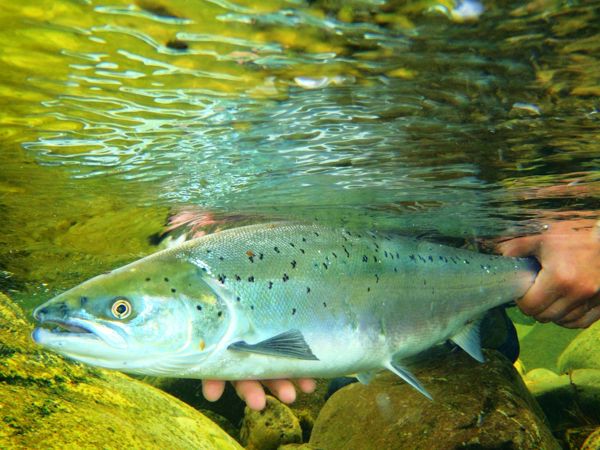New report warns of threat to small salmon populations

A new report commissioned by Natural Resources Wales has some stark findings for the future of salmon populations.
The identification and characterisation of small salmon populations to support their conservation and management evidence report looks at the decline of salmon, and sea trout, populations across Wales and considers whether and when they may become critically small, in order to support their conservation and management.
The report confirms that Atlantic salmon are under threat not only in Wales but throughout most of its range but suggests that salmon may disappear completely from many Welsh rivers within the next few decades.
Ben Wilson. Principal Fisheries Officer for NRW, said:
“Atlantic salmon and sea trout in Wales are declining at unprecedented rates and, in many areas, are currently below sustainable biological limits.
“Forecasts that small populations are at risk of extinction are deeply concerning, although uncertainty about the scale and location of any such extinctions remains high and some populations remain relatively stable.
“Climate change is the most likely cause of a decline in salmon numbers. Changing ocean conditions mean poor marine survival is affecting all populations, and higher river temperatures in winter and summer affect spawning and juvenile survival in many Welsh rivers.
“Local impacts such as water and habitat quality also have an adverse effect on fish numbers as evidenced by the variation in neighbouring populations.”
Despite the report’s dire warnings there is evidence in Wales and further afield that, even where salmon and sea trout populations have been severely depleted, stocks have recovered when limiting factors are removed or reduced.
Although no fixed threshold exists below which recovery is impossible, the longer populations remain below the safe limits; the less likely recovery will be.
The report emphasises that restoring connectivity and improvements in the quantity and quality of available habitats are the best ways to support and restore runs of fish.
Ben added:
“Although this report confirms many of our fears, there is still hope that by working together, we will be able to turn this situation around. As David Attenborough says, ‘Never has there been a more important time to invest in out wildlife’.
“The history of salmon in the British Isles and elsewhere has examples of populations that have recovered from very low population size, or even from complete extinction once the constraining factors are lifted .
“To do this we need greater understanding of how and why populations decline and recover and provide practical advice on what to do when populations become critically low.
“The decline is salmon numbers is a clear example of the loss of biodiversity which is fuelling the Welsh nature emergency.
“We must build a broad coalition across all sectors and institutions to embed pro-nature thinking and delivery in everything we do to help reassemble and reinvigorate the ecosystems we all depend upon.”
The full report can be found here https://cdn.cyfoethnaturiol.cymru/media/696308/nrw-evidence-report-no-674-the-identification-and-characterisation-of-small-salmon-populations-to-support-their-conservation-and-management.pdf
